高三英语一轮复习语法专题--从句
- 格式:docx
- 大小:27.47 KB
- 文档页数:9

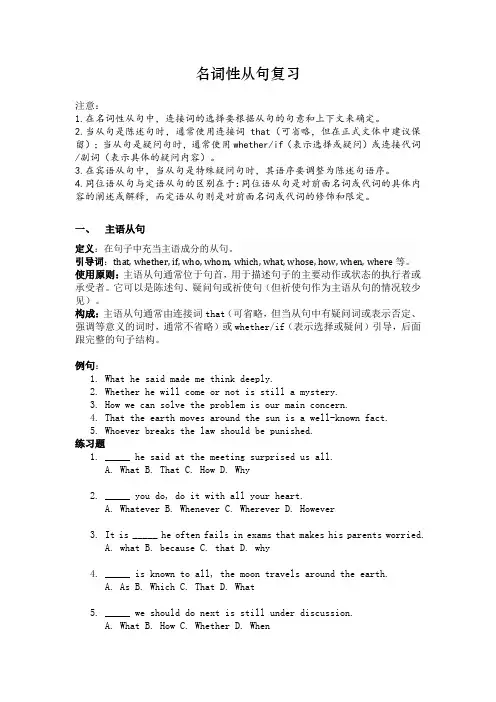
名词性从句复习注意:1.在名词性从句中,连接词的选择要根据从句的句意和上下文来确定。
2.当从句是陈述句时,通常使用连接词that(可省略,但在正式文体中建议保留);当从句是疑问句时,通常使用whether/if(表示选择或疑问)或连接代词/副词(表示具体的疑问内容)。
3.在宾语从句中,当从句是特殊疑问句时,其语序要调整为陈述句语序。
4.同位语从句与定语从句的区别在于:同位语从句是对前面名词或代词的具体内容的阐述或解释,而定语从句则是对前面名词或代词的修饰和限定。
一、主语从句定义:在句子中充当主语成分的从句。
引导词:that, whether, if, who, whom, which, what, whose, how, when, where等。
使用原则:主语从句通常位于句首,用于描述句子的主要动作或状态的执行者或承受者。
它可以是陈述句、疑问句或祈使句(但祈使句作为主语从句的情况较少见)。
构成:主语从句通常由连接词that(可省略,但当从句中有疑问词或表示否定、强调等意义的词时,通常不省略)或whether/if(表示选择或疑问)引导,后面跟完整的句子结构。
例句:1.What he said made me think deeply.2.Whether he will come or not is still a mystery.3.How we can solve the problem is our main concern.4.That the earth moves around the sun is a well-known fact.5.Whoever breaks the law should be punished.练习题1._____ he said at the meeting surprised us all.A. WhatB. ThatC. HowD. Why2._____ you do, do it with all your heart.A. WhateverB. WheneverC. WhereverD. However3.It is _____ he often fails in exams that makes his parents worried.A. whatB. becauseC. thatD. why4._____ is known to all, the moon travels around the earth.A. AsB. WhichC. ThatD. What5._____ we should do next is still under discussion.A. WhatB. HowC. WhetherD. When答案:AAC(强调句结构)AA二、宾语从句定义:在句子中充当宾语成分的从句。
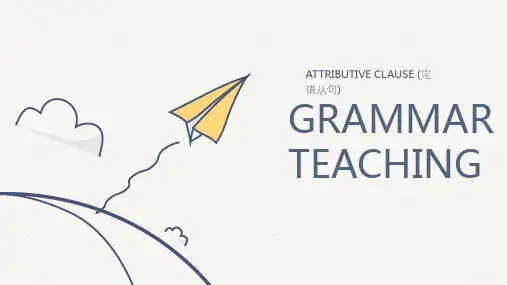
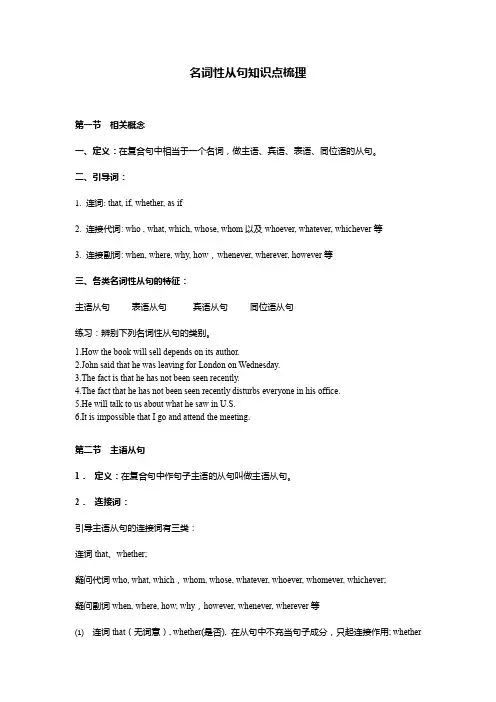
名词性从句知识点梳理第一节相关概念一、定义:在复合句中相当于一个名词,做主语、宾语、表语、同位语的从句。
二、引导词:1. 连词: that, if, whether, as if2. 连接代词: who , what, which, whose, whom以及whoever, whatever, whichever等3. 连接副词: when, where, why, how,whenever, wherever, however等三、各类名词性从句的特征:主语从句表语从句宾语从句同位语从句练习:辨别下列名词性从句的类别。
1.How the book will sell depends on its author.2.John said that he was leaving for London on Wednesday.3.The fact is that he has not been seen recently.4.The fact that he has not been seen recently disturbs everyone in his office.5.He will talk to us about what he saw in U.S.6.It is impossible that I go and attend the meeting.第二节主语从句1.定义:在复合句中作句子主语的从句叫做主语从句。
2.连接词:引导主语从句的连接词有三类:连词that、whether;疑问代词who, what, which,whom, whose, whatever, whoever, whomever, whichever;疑问副词when, where, how, why,however, whenever, wherever等⑴连词that(无词意), whether(是否), 在从句中不充当句子成分,只起连接作用; whether能引导主语从句,而if不能。
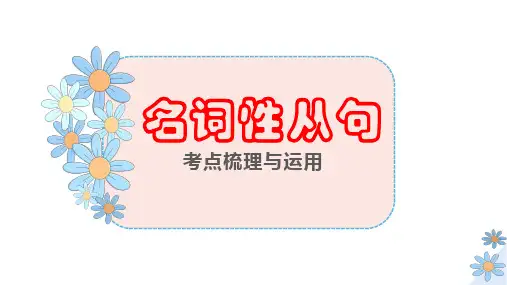
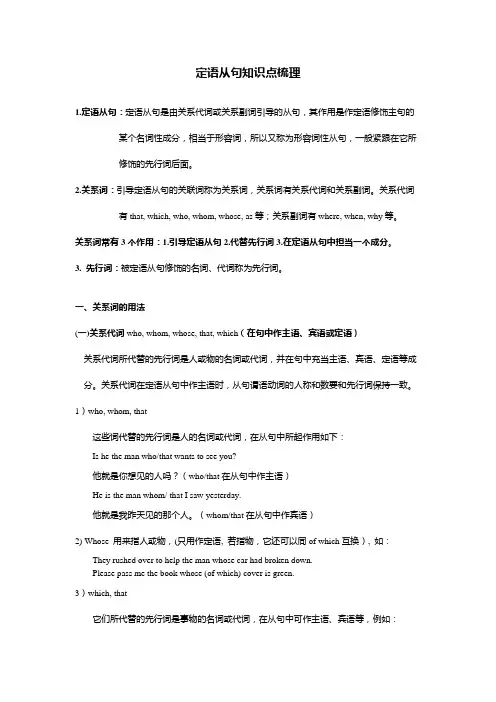
定语从句知识点梳理1.定语从句:定语从句是由关系代词或关系副词引导的从句,其作用是作定语修饰主句的某个名词性成分,相当于形容词,所以又称为形容词性从句,一般紧跟在它所修饰的先行词后面。
2.关系词:引导定语从句的关联词称为关系词,关系词有关系代词和关系副词。
关系代词有that, which, who, whom, whose, as等;关系副词有where, when, why等。
关系词常有3个作用:1.引导定语从句2.代替先行词3.在定语从句中担当一个成分。
3. 先行词:被定语从句修饰的名词、代词称为先行词。
一、关系词的用法(一)关系代词who, whom, whose, that, which(在句中作主语、宾语或定语)关系代词所代替的先行词是人或物的名词或代词,并在句中充当主语、宾语、定语等成分。
关系代词在定语从句中作主语时,从句谓语动词的人称和数要和先行词保持一致。
1)who, whom, that这些词代替的先行词是人的名词或代词,在从句中所起作用如下:Is he the man who/that wants to see you?他就是你想见的人吗?(who/that在从句中作主语)He is the man whom/ that I saw yesterday.他就是我昨天见的那个人。
(whom/that在从句中作宾语)2) Whose 用来指人或物,(只用作定语, 若指物,它还可以同of which互换), 如:They rushed over to help the man whose car had broken down.Please pass me the book whose (of which) cover is green.3)which, that它们所代替的先行词是事物的名词或代词,在从句中可作主语、宾语等,例如:A prosperity which / that had never been seen before appears in the countryside.The package (which / that) you are carrying is about to come unwrapped.4) asAs用于先行词前有as, so, such, the same修饰的限制性定语从句.You can take as many books as you need.(二) 关系副词when, where, why(在句中作状语)1. when指时间,在定语从句中做时间状语(1) I still remember the day when I first came to the school.(2) The time when we got together finally came.2. where指地点,在定语从句中做地点状语(1) Shanghai is the city where I was born.(2) The house where I lived ten years ago has been pulled down.3. why指原因,在定语从句中做原因状语(1) Please tell me the reason why you missed the plane.(2) I don’t know the reason why he looks unhappy today.注意:关系副词引导的从句可以由“介词+关系代词”引导的从句替换(1) The reason why/ for which he refused the invitation is not clear,(2) From the year when/in which he was going to school he began to know what he wanted when hegrew up.注意:介词+关系代词引导的定语从句关系代词在定语从句中做介词宾语时1. 含有介词的动词短语一般不拆开使用,如:look for, look after, take care of等(1) This is the watch which/that I am looking for. (T)(2) This is the watch for which I am looking. (F)2. 若介词放在关系代词前,关系代词指人时用whom,不可用who或者that;指物时用which,不能用that;关系代词是所有格时用whose(1) The man with whom you talked is my friend. (T)(2) The man with that you talked is my friend. (F)3. “介词+关系代词”前可有some, any, none, both, all, neither, most, each, few等代词或者数词(1) He loved his parents deeply, both of whom are very kind to him.(2) In the basket there are quite many apples, some of which have gone bad.4. 介词后面的关系词不能省略。
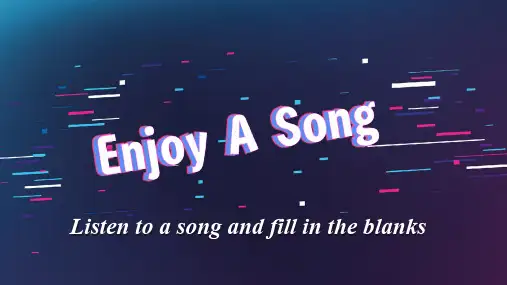


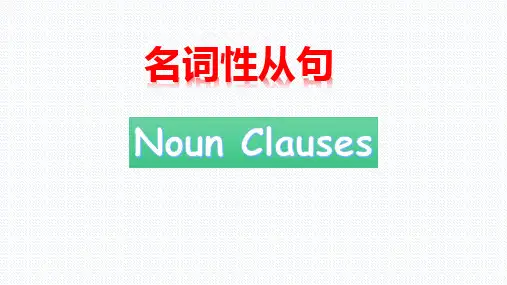
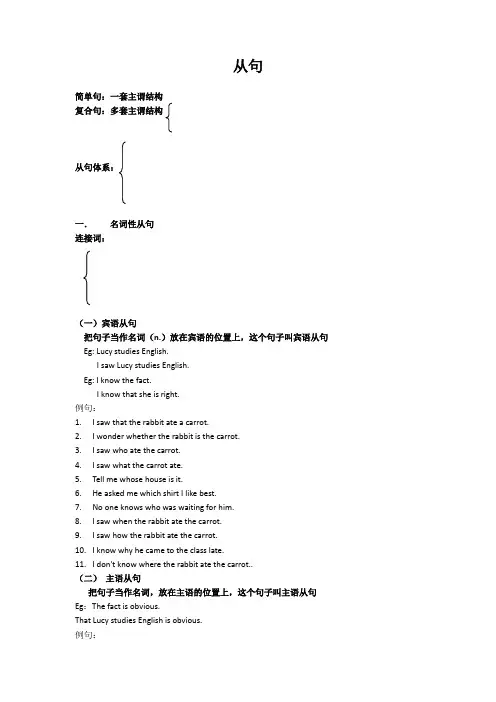
从句简单句:一套主谓结构复合句:多套主谓结构从句体系:一.名词性从句连接词:(一)宾语从句把句子当作名词(n.)放在宾语的位置上,这个句子叫宾语从句Eg: Lucy studies English.I saw Lucy studies English.Eg: I know the fact.I know that she is right.例句:1.I saw that the rabbit ate a carrot.2.I wonder whether the rabbit is the carrot.3.I saw who ate the carrot.4.I saw what the carrot ate.5.Tell me whose house is it.6.He asked me which shirt I like best.7.No one knows who was waiting for him.8.I saw when the rabbit ate the carrot.9.I saw how the rabbit ate the carrot.10.I know why he came to the class late.11.I don't know where the rabbit ate the carrot..(二)主语从句把句子当作名词,放在主语的位置上,这个句子叫主语从句Eg:The fact is obvious.That Lucy studies English is obvious.例句:1.Whether the rabbit ate carrots is obvious.2.It is obvious that the rabbit ate the carrot.3.It is obvious who ate the carrot.4.It is obvious whom Tom was waiting for.5.It is obvious whose house is it.6.It is obvious which shirt I like best.7.It is obvious when the rabbit ate the carrot.8.It is obvious how the rabbit ate the carrot.9.It is obvious why he came to the class late.10.It is obvious where the rabbit ate the carrot..(三)表语从句把句子当作名词,放在表语的位置上,这个句子叫表语从句例句:1.The problem is that the rabbit is hungry.2.The reason is that there’s more carrot.3.The question is whether the rabbit is hungry.4.The question is what the rabbit should eat.5.The question is where/when/how/rabbit ate the carrot.6.The question is when we get a pay rise.(四)同位语从句把句子当作名词,放在同位语的位置上,这个句子叫同位语从句同位语:解释说明名词的内容或实质的成分。
2024年山东省夏季高考高中英语主从复合句之状语从句考点清单1.基本概念状语是用来修饰动词,形容词,副词或句子的一种句子成分。
它可以表示时间、地点、原因、目的、结果、条件、让步、比较、方式等。
当一个句子充当状语时,也就是状语从句。
2.时间状语从句1)when,whiIe,as连词从句谓语动词用法when 延续性动词、非延续性动词从句的动作和主句的动作可以同时发生,也可以先后发生while延续性动词从句的动作与主句的动作同时发生as延续性动词强调主从句动作相伴发生,可译为“一边……一边……;随着”e.g.While/When I was read i ng,he came i n.(我正在看书时,他进来了)The students sang as they wa I ked.(学生们边走边唱)Meta I s expand when they are heated.(金属受热时会膨胀)2)before/sineebefore基本语义“在…之前",还可译为"还未…就…”"…才…”"还没来得及…"常用句式有:①It wi I I(not)be---段时间+before...“(没有)过....(时间)才(就)....."②It was not Iong before...“不久...就...."③It was+时间段+before...“过了...(时间)才...."s i nc i意为“自从以来…"常用句式为:It is/has been+一段时间+sinee…(从句用一般过去时)e.g.It will be half a year before I come back.我半年之后才回来。
It won't be Iong before we meet again.用不了多久我们就能再见面。
It was three days before he came back.三天后他才回来。